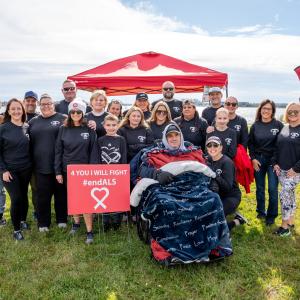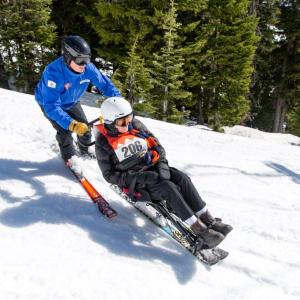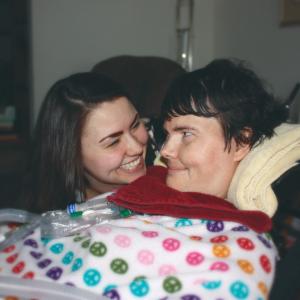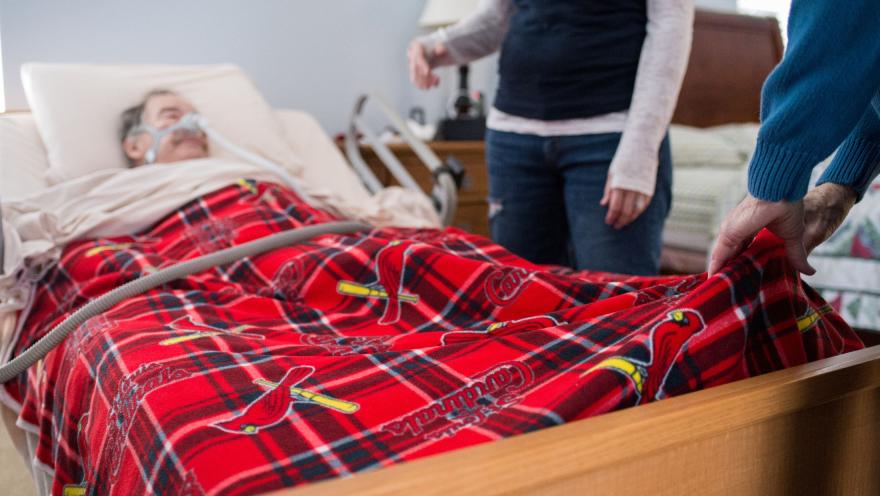
Depending on where you live, cold weather is likely something you have to deal with during the winter months. While lower temperatures and cold weather can present special challenges for people living with ALS, it doesn’t mean they can’t enjoy this time of year.
People with ALS already experience stiff muscles in their hands, arm, legs and feet, and winter temperatures can make this situation worse. Cold weather causes muscles to contract and become tight, which can be painful. Muscles that are already weak can become even more strained and have to work harder to warm up and stay warm. Stretching and range-of-motion (ROM) exercises can be beneficial year-round, but they can be especially helpful when the temperature falls. Muscle massages are also welcome and a great way to loosen up stiff limbs.
Another contributor to stiff muscles is dry air. Regardless of the temperature you like to keep your thermostat set to, you might want to consider a humidifier for your home to help address dry air. However, be sure to follow the instructions for cleaning and changing filters as needed.
You can also make your home comfy with blankets, comforters and quilts. They are great for keeping you warm and can be layered on as needed. Electric blankets can be helpful as well, however, people with ALS should be aware that poor circulation can make it difficult to determine if the blanket becomes too hot and can cause harm to whichever part of the body the blanket is covering, so make sure to monitor regularly during use.

But even if you do everything possible to keep your home nice and warm, there will likely be times when you have to venture out into the elements. When facing the cold, sometimes it’s not just important to bundle up, but how you bundle up.
Most of us have heard to “dress in layers” to be prepared for whatever you might run into, but the idea behind layering isn’t simply to put clothes on top of more clothes. Each layer can—and should—be chosen for maximum benefit.
For example, the layer nearest your skin should wick away moisture. When moisture or sweat cools it condensates, and if this moisture remains on your skin it can actually make you feel colder. Wicking fabrics, most of which are made of some type of polyester, keep you dry by transporting this moisture and the cooling effects of evaporation away from your body.
Fabrics such as wool and fleeces are good middle level layers. They trap warm air while being resistant to moisture and they’re usually lightweight and dry easily. Your outer layers should keep out wind, snow, or water. Ideally this layer will be either waterproof or at least water-resistant.

Also, remember most body heat is lost through your extremities, so don’t forget your hat and mittens or gloves. For really cold days or longer trips, disposable or reusable hand and foot warmers are inexpensive and easy to pack.
Regardless of if you enjoy the cold nights cozied up at home with family and friends, or if you can’t wait for the first warm days of spring to arrive, being proactive and planning can help keep you comfortable through the winter months and help you enjoy the season as you see fit.
To continue to follow stories about people living with ALS in the community and learn more about the disease, subscribe to receive our weekly blogs in your inbox HERE or follow us at als.org/blog.


Comments
Both my feet have dropped so the blood doesn’t circulate. They get really red and blue. I try to put my feet above my heart to get some relief. They throb
most of the day because they are down and my feet and legs are so cold. Is this common?
Hello Lorraine,
I'm so sorry you're having these symptoms. The ALS Association is a patient advocacy organization, and we cannot answer medical questions. We recommend that you reach out to your doctor or clinic team to ask about your medical concerns. You can find an ALS clinic near you here: https://www.als.org/clinics.
Join the conversation. Please comment below.